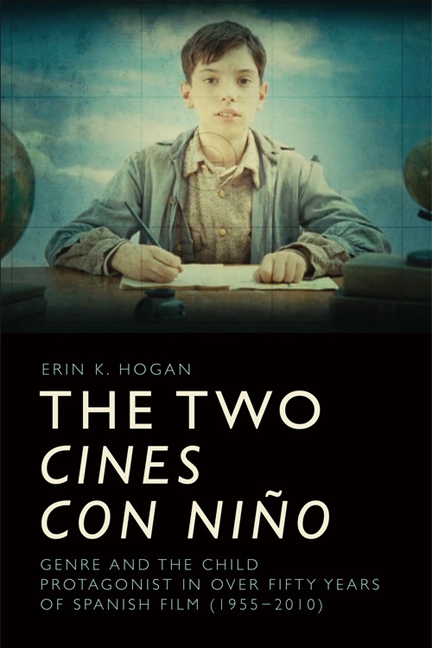Book contents
- Frontmatter
- Contents
- List of Figures
- Acknowledgements
- Figure Permissions
- Introduction The Two Cines Con Niño: The Ventriloquism, Dialogism and Biopolitics of the Children of Franco in Genre Film
- 1 The Black Market and the Stolen Children of Franco in Demonios En El Jardín
- 2 The Appropriative and Carnivalesque Ventriloquism of Altar Boys from Joselito in El pequeño ruiseñor to Ignacio in La mala Educación
- 3 Ventriloquism, Kidnapping and the Carnivalesque in Marisol’s Tómbola
- 4 Adopting, Adapting and Appropriating in the cines con niño: Un rayo de luz and El viaje de Carol
- 5 Prosopopeia and the Gothic Child from Marcelino pan y vino to El Orfanato
- 6 Dialogism and Ritual Function of the Nuevo Cine Con Niño: El Espíritu De La Colmena, Secretos Del Corazón And El Laberinto Del Fauno
- 7 Queering Post-war Childhood in Urte Ilunak and Pa Negre
- 8 The Transatlantic Dialogism in Narrative and Aesthetics of Bildungsfilms: La Lengua De Las Mariposas, Machuca, El Espíritu De La Colmena, El Premio, El Laberinto Del Fauno And Infancia Clandestina
- Conclusion Spanish Movies: Genre, Nation and Spanish Movie
- Select Filmography
- Select Bibliography
- Index
8 - The Transatlantic Dialogism in Narrative and Aesthetics of Bildungsfilms: La Lengua De Las Mariposas, Machuca, El Espíritu De La Colmena, El Premio, El Laberinto Del Fauno And Infancia Clandestina
Published online by Cambridge University Press: 01 May 2021
- Frontmatter
- Contents
- List of Figures
- Acknowledgements
- Figure Permissions
- Introduction The Two Cines Con Niño: The Ventriloquism, Dialogism and Biopolitics of the Children of Franco in Genre Film
- 1 The Black Market and the Stolen Children of Franco in Demonios En El Jardín
- 2 The Appropriative and Carnivalesque Ventriloquism of Altar Boys from Joselito in El pequeño ruiseñor to Ignacio in La mala Educación
- 3 Ventriloquism, Kidnapping and the Carnivalesque in Marisol’s Tómbola
- 4 Adopting, Adapting and Appropriating in the cines con niño: Un rayo de luz and El viaje de Carol
- 5 Prosopopeia and the Gothic Child from Marcelino pan y vino to El Orfanato
- 6 Dialogism and Ritual Function of the Nuevo Cine Con Niño: El Espíritu De La Colmena, Secretos Del Corazón And El Laberinto Del Fauno
- 7 Queering Post-war Childhood in Urte Ilunak and Pa Negre
- 8 The Transatlantic Dialogism in Narrative and Aesthetics of Bildungsfilms: La Lengua De Las Mariposas, Machuca, El Espíritu De La Colmena, El Premio, El Laberinto Del Fauno And Infancia Clandestina
- Conclusion Spanish Movies: Genre, Nation and Spanish Movie
- Select Filmography
- Select Bibliography
- Index
Summary
Introduction
In this monograph, I have thus far illuminated the rich dialogism of child-starred cinemas in Spain. The final chapter will broaden this study's geographic scope to provide an overview of the dialogism and aesthetics of bildungsfilms across the Atlantic in the 2000s. Latin American cinema, with films hailing from Argentina, Brazil, Cuba, Mexico, Peru, and Venezuela, has enjoyed its own bumper crop of approximately fourteen child-starred bildungsfilms over eleven years. The bildungsfilms, defined as ‘películas de aprendizaje o formación con protagonistas que son niños’ (Deveny 2012: 397) (coming-of-age films with child protagonists), that I will examine here link sexual and political awakening at the time of military or paramilitary coups in Spain, Chile, and Argentina. Compared with other subgenres of the nuevo cine con niño enumerated in the monograph's introduction, the bildungsfilm is the variant that most closely resembles the definition of cinema of ‘childhood’ in the Diccionario temático del cine:
[C]ontrasta con retratos más realistas, imaginativos o con mayor voluntad de indagación en el estadio infantil con historias sobre la nostalgia del paraíso perdido de la infancia, los recuerdos filtrados por la memoria, experiencias sorprendentes (felices o traumáticas), procesos de aprendizaje y conocimiento del mundo, etc. Obviamente, en muchos de ellos es el punto de vista cognitivo del niño–más o menos verosímil – lo que otorga a la historia un carácter híbrido, muy capaz de combinar la tragedia con la mirada ingenua, la fabulación sobre realidades cotidianas con la distorsión de los hechos. (Sánchez Noriega 2004: 270)
[[I]t contrasts with more realistic, imaginative or critical portrayals of the phase of childhood and stories of the nostalgia of the lost paradise of childhood, recollections filtered by memory, surprising (happy or traumatic), processes of learning and dis-covery of the world, etc. Obviously, in many of them it is the cognitive point of view of the child – more or less credible – that which grants the story a hybrid character, very capable of combining tragedy with the naïf gaze, story-telling of daily realities with distortion of the facts.]
The motifs of the lost paradise of childhood beside gained knowledge of the adult world pervade the bildungsfilms at the heart of this chapter. With attention to national acculturations, I will pair select Spanish and Latin American films to reveal common political use, motifs, and aesthetics of cinematic childhood across national cinemas.
- Type
- Chapter
- Information
- The Two cines con niñoGenre and the Child Protagonist in Fifty Years of Spanish Film (1955–2010), pp. 164 - 199Publisher: Edinburgh University PressPrint publication year: 2018



